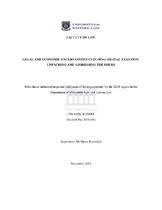| dc.description.abstract | The digital economy has over the past years developed at a dramatic pace, generating substantial revenues for entities and individuals trading on this platform. This has fuelled vast interest and debate into whether such activity should be taxed. After the turn of the millennium, a lot of research on taxing the digital economy was done, but this was mostly in America and Europe. In South Africa, very little research has been done, most of which was conducted before the
enactment of new pieces of legislation regulating digital tax. This study analyses how the South African digital tax framework interlinks with global tax principles. More specifically, the study seeks to clarify the legal and economic uncertainties
surrounding the taxation of e-trade. The pertinent issues around this area will then be analysed in depth and potential solutions furnished. The Taxation Laws Amendment Act 21 of 2013 changed the position in South Africa in respect of the supply of electronic services. The definition of ‘enterprise’ was extended to include the supply of electronic services by a person or business outside South Africa, to a recipient in South Africa. Therefore, foreign enterprises could become liable to register as vendors in terms of s 23 of the Act, and become subject to VAT in terms of s 7 (1) (a) of the Value Added Tax Act 89 of 1991. Amongst other implications, the new regulations effectively shift the compliance burden from the local recipient to the foreign supplier in terms of the listed electronic services while at the same time creating compliance costs for the foreign supplier. The study builds on models adopted by other countries on the international scene. The United
States and European countries have taken different paths on the matter compared to the one adopted by South Africa. The United States imposed a temporary moratorium on states levying certain taxes on Internet sales, while, on the other hand, the European Union levied different digital tax standards, which depend on whether or not the supplier is based in Europe. The research concludes that the majority of the problems surrounding the taxation of e-trade are not of a sovereign nature but rather of a multi-jurisdictional nature. The study recommends that at a global level, there is a need for the creation of: new e-tax rules in the WTO regime; a central registration portal; a third party collection and payment mechanism, an imbedded audit system in the portal; as well as built-in privacy mechanisms in order cure the existing shortcomings in taxing Internet transactions. For South Africa, the study suggests that the National Treasury create a timeline for the creation of a White Paper on the taxation of electronic commerce and the subsequent creation of more comprehensive Electronic Service Regulations within a
reasonable period thereafter. | en_US |

